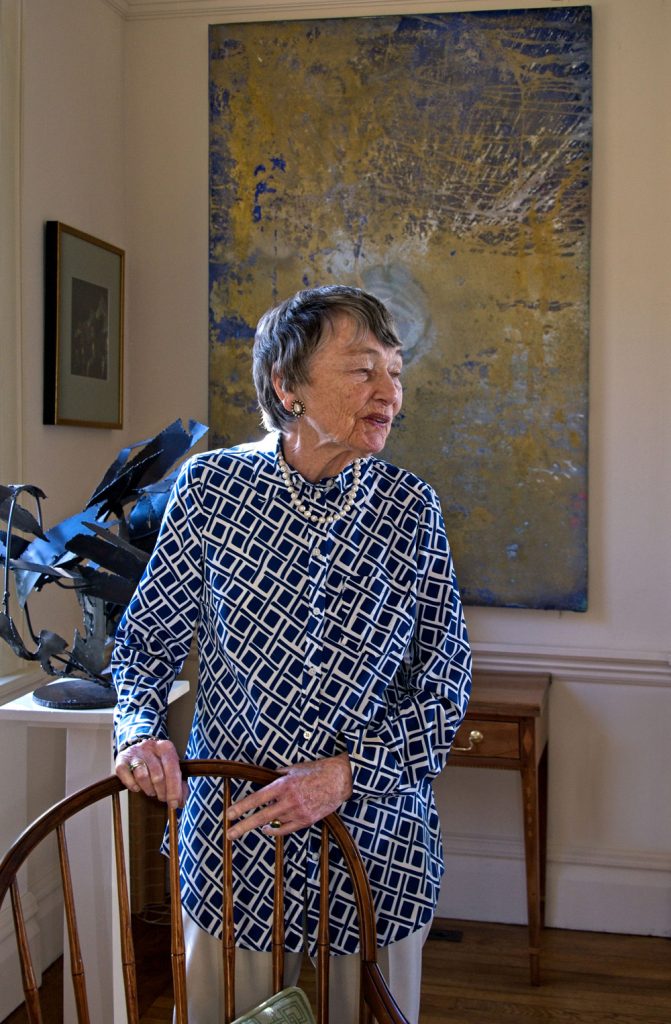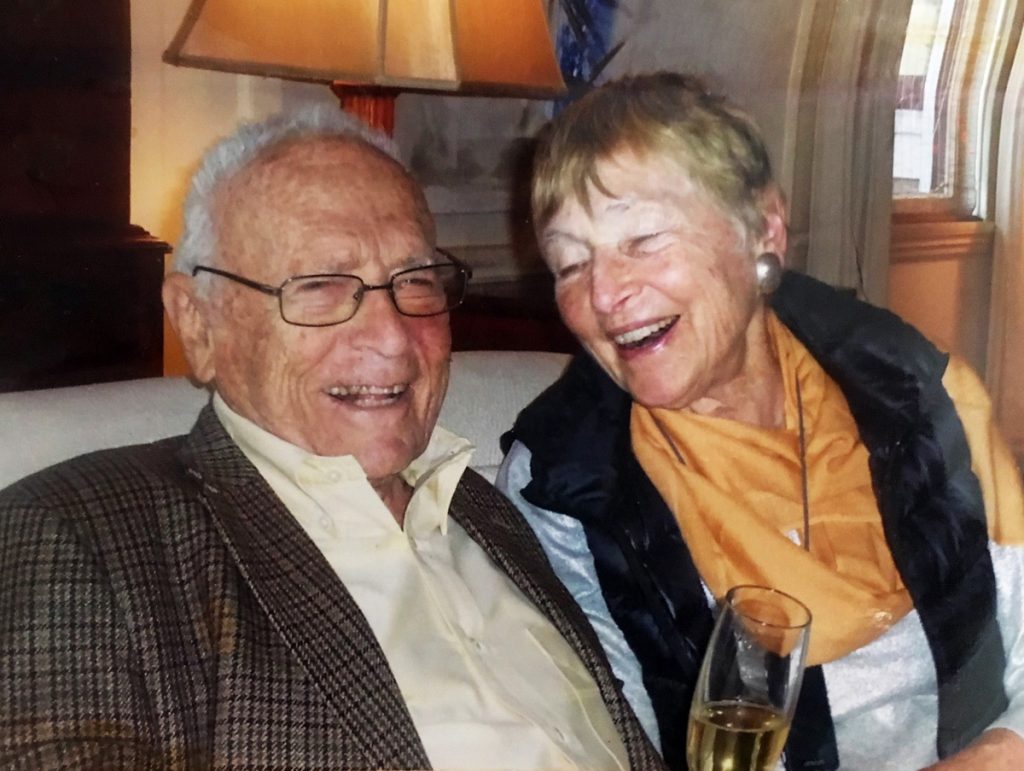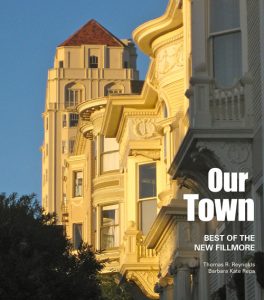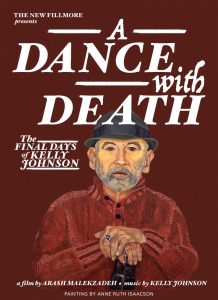Glady Thacher started four nonprofits in her oversized living room — and they’ve helped people live better lives
By FRAN MORELAND JOHNS
Soon after her graduation from Smith College in the late 1940s, Glady Thacher took on the traditional roles of supportive wife and mother then mandatory for most women. But she quickly decided there was a loftier goal: reaching her full potential — and helping others reach theirs, too. As a result, thousands of women, and not a few men, have Thacher to thank for broadening and enriching their lives — mostly through organizations she nurtured and launched in her own living room.
She and Jim Thacher, who had finished Yale Law School after serving in the Army during World War II, moved to San Francisco from the east coast with their first child — she was pregnant with their second — in 1953. “I had loved San Francisco since the first time I visited, when I was 17,” she says. “I loved the life of freedom and spaciousness.”
Thacher was a painter in those mid-1950s days. “But it dawned on me that was pretty selfish, with a husband and two kids,” she says. “So I closed up the studio and made space for a ‘mother’s helper.’ I fell back to being just a mom, being a nonentity.”
There were eventually two sons and two daughters; today, there are also 10 grandchildren and two great-grandchildren. Along the way, her just-a-mom role morphed as Thacher took on multiple civic endeavors.
“My life changed toward a true vocation when I was asked to sit on the board of Conard House,” Thacher says of the nonprofit that provides resources for people living with chronic mental illness. “Founder Elaine Mikels had gotten a grant from the National Institutes of Health to create the first halfway house for young people with mental illness coming back from Napa State Hospital. I’d never been on a board before. We were in dire need of money, and I’d never even been a fundraiser before.”
A Chronicle story and a state grant got the nonprofit on its way, and the rest was up to the board. “Cissie Swig was on the board — she was so gorgeous,” Thacher recalls. “We would go up to Sacramento with another board member and beg for money.”
Thacher delights in telling how the three each committed to asking one designated person for $1,000, and Swig — now widely renowned for her philanthropic and other accomplishments — was the only person who didn’t get the money. Thacher’s success confirmed her future as a dynamic fundraiser for organizations she created and supported.
“A relative said I became ‘a legendary beggar,’ ” she says. “That made perfect sense to me: a beggar is a beggar.”
The causes Thacher was begging for would also become legendary. “What I was really interested in was why young adults should feel so unempowered,” she says. “So I went for a counseling degree at San Francisco State. This was in the late 1960s, when everything was in turmoil at S.F. State. The experience far outweighed the academics, opening my eyes to what others were going through.”
The Thachers had bought a house in Presidio Heights with a main room about half the size of a basketball court. A previous owner had knocked out some walls to double the size of the room, made even grander by its 12-foot ceiling.
“I looked at the size of this living room, and saw I could create an office where the students I’d been practicing counseling on could come,” she says now, sitting in the same spot. “I set up desks, a 3M copier on the piano and a card catalogue. Then I persuaded a number of parents to be on a volunteer board. Kids from 14 to 18 needed to learn what they could do and get paid for — to find out they were worth something.”
Enterprise for Youth was born to solve the problem that seemed obvious to Thacher: No one — neither parents nor teachers — was truly listening to the young people, asking them about their skills, interests and dreams. Initially, she paired questing high school students with friends of hers “who had training in non-judgmental listening skills.”
The nonprofit organization soon outgrew Thacher’s spacious living room, meaning more funding was needed. Board member Nancee Erickson spearheaded the creation of the San Francisco Art and Antiques Show, which recently concluded its 37th year as a major Bay Area event — and guarantees support for Enterprise.
Next Thacher wanted to share her path to empowerment with others of her generation. She began inviting other Smith graduates into her living room and counseling them about career choices. “I was intensely hated by their husbands,” she recalls. The Smith graduates soon expanded to the other Seven Sister colleges, and from there to college graduates in general. Eventually it became Alumnae Resources, which offered career counseling to hundreds of women — “until the internet came along,” Thacher says, and career centers were no longer needed.
She says her husband was not among the ranks of the naysayers. “I had a little nest egg of my own,” Thacher acknowledges, “but I was blessed that Jim never felt women were inferior.”
Another Thacher enterprise is the San Francisco Education Fund, which she founded in 1979 to support public education and help those from underserved communities graduate ready for college, careers and civic responsibility.
Later her spacious living room would provide a place for the beginnings of yet another nonprofit, San Francisco Village, when Thacher and a group of other committed adults gathered to address concerns about aging and housing for older people in the city. Officially launched in 2009, San Francisco Village now has a staff of five, a volunteer corps of 175 and more than 375 members ranging in age from 60 to 96, located in 25 different neighborhoods.
Thacher’s contributions to the community and the wider world did not come without personal cost. “I was not a good mother,” she says in her usually direct manner. “When I graduated from college, women were on the cusp of emerging in their own time. But even the most educated wives were expected to drop everything and support their husband’s careers. Being a mother could not be a win-win; you were taking something out of the bank and away from your own children. My oldest daughter in particular felt gypped. We have had our ups and downs, but are now pretty much on the same page.”
The Thachers were never your ordinary family. Glady — as she is known to one and all, although her given name is Gladys — was busy improving the world. The four children were growing up into their own distinct careers and choices. Jim Thacher was deeply involved in Democratic politics — local, state and national — and in a Marin sheep ranch he bought when the children were young.
“There were Christmas mornings when Jim was at the ranch,” Thacher recalls, “because sheep don’t observe holidays.”
He could be found walking the 40 or so blocks to his downtown law office every day, and elsewhere around San Francisco, often accompanied by his brother, Carter. It was on one such long walk that he suffered one of the two strokes that took his life in 2008. He was 83 years old. “We had a happy, stable marriage,” Glady recalls with a contented smile.
“I’m still busy, and very happy,” says the octogenarian activist. Staying busy involves keeping her fingers in multiple community pies, reading, walking her dog, Brody, and spending time with “Dear David” Perlman, her companion.
A late-life romance
SEVERAL YEARS AFTER her husband Jim Thacher’s death in 2008, Glady Thacher crossed paths with longtime San Francisco Chronicle science editor David Perlman, whose wife had died five years earlier.
“Jim and I used to go out to dinner at Osteria on Sacramento, and David and his wife were often there, too. We didn’t really know them, and they sat at a table on the other side of the restaurant,” she recalls. “But I knew who he was. A relative of mine wanted to be a journalist, so I corralled David to counsel her.”
That was the beginning of their friendship. Although Thacher says she was not interested in Perlman romantically at first, that slowly changed. “It took about a year,” she says. “A friend asked him to bring me to a birthday party, and I decided we should be boyfriend-girlfriend. I told people for a while that I had a boyfriend, but he didn’t know it yet.”
Perlman eventually reached the same conclusion, after a small incident of jealousy when Thacher went to another party in the company of another gentleman. The two have been a happy couple for half a dozen years. In her 80s and his 90s, they traveled to visit friends and family on the east coast, and to Paris and the south of France just for fun. At the end of last year, Thacher helped Perlman celebrate his 100th birthday. “All the family came,” she reports. “I made him a yearbook.”
Perlman, who has had a few recent health issues, now uses a wheelchair and has full-time help, but he “spends no time feeling down,” Thacher says. She walks the dozen or so blocks from her home in Presidio Heights to his home in the Inner Richmond to spend most weekends, and they enjoy dinners and quiet times together.
As with many late-life romances that follow long, happy marriages, not all of their children are enthusiastic. But most in their extended families simply appreciate the joy that these two legendary San Franciscans have found in one another.
“It is just a lovely romance,” says one longtime friend. “Sometimes I think late-life romances are the loveliest of all.”
— Fran Moreland Johns
Filed under: Good Works, Locals






